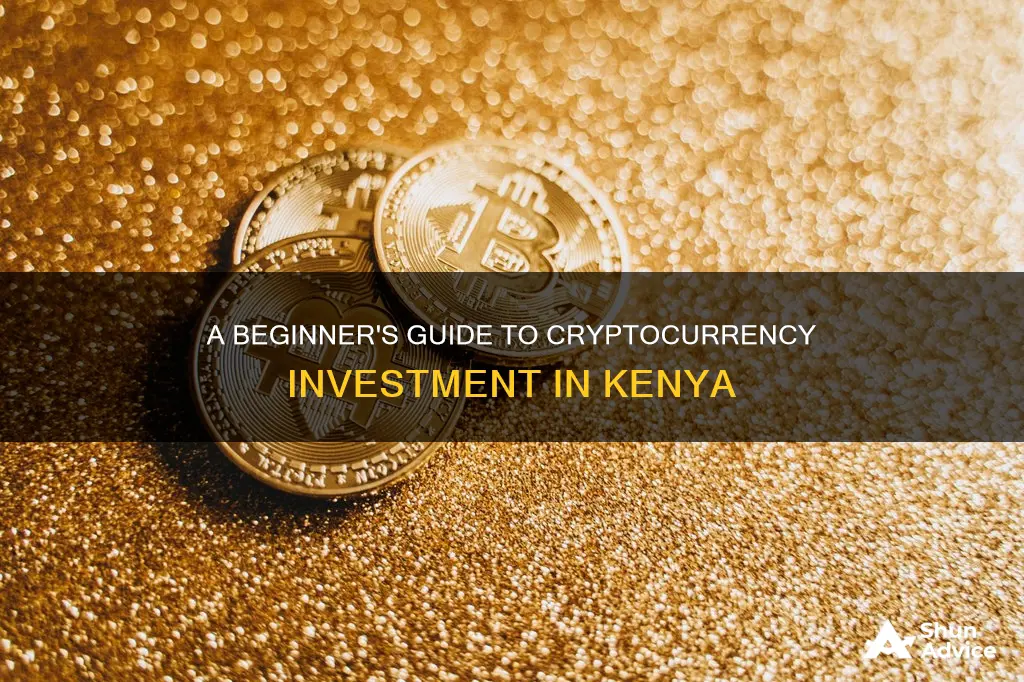
Cryptocurrency is a digital or virtual asset that uses cryptography to secure transactions, control the creation of new units, and verify the transfer of assets. It has become popular because it offers many advantages over traditional currencies, such as decentralisation, anonymity, security, and low fees. In Kenya, there is no law banning Bitcoin, but it is not legal tender and the Central Bank of Kenya discourages people from trading in it. However, it is still possible to buy, trade, exchange, hold and store cryptocurrencies in the country as long as one does not break any existing laws. This article will provide a step-by-step guide on how to invest in cryptocurrency in Kenya.
What You'll Learn

Choose a cryptocurrency exchange platform
There are several cryptocurrency exchange platforms available in Kenya, each with its own unique features and offerings. Here are some factors to consider when choosing a platform:
- Supported currencies: Ensure the platform supports the cryptocurrencies you want to buy or trade. For example, Coinbase offers access to over 100 cryptocurrencies.
- Payment methods: Check what payment methods the platform accepts. For instance, some platforms like Paxful allow you to buy crypto using M-Pesa, PayPal, bank transfer, and cash.
- Fees: Compare the fees charged by different platforms. Binance, for instance, offers low transaction fees, and these fees are even lower if you use their native Binance Coin.
- Security: Research the platform's security features and reputation. Look for platforms that offer two-factor authentication and insurance on your crypto, like Coinbase.
- Location: Ensure the platform operates in Kenya. For example, Binance and Coinbase are well-known international platforms that operate in the country.
- Ease of use: Consider how easy the platform is to navigate, especially if you're a beginner. While some platforms like eToro offer a wealth of information, others like Binance can be overwhelming for newcomers.
Some of the most popular cryptocurrency exchange platforms in Kenya include:
- Coinbase
- Binance
- Etoro
- Paxful
- Kraken
- LocalBitcoins
- Yellow Card
Bitcoin Investment: A Con or a Legit Opportunity?
You may want to see also

Create an account and verify your identity
Once you've chosen a cryptocurrency exchange, you'll need to create an account and verify your identity. This usually involves providing personal information such as your name, email address, and phone number. You may also need to provide documentation, such as a copy of your National ID, passport, or driver's license.
It's important to use a strong password for your account. Consider using a password manager like LastPass to generate a secure password that you won't need to remember. Additionally, two-factor authentication can add an extra layer of security to your account.
After creating your account, you may need to further verify your identity by providing additional documentation or completing other requirements specified by the exchange.
Once your account is verified, you can proceed to the next step of depositing funds into your account.
Bitcoin's Investment Legacy: Was It Worth the Risk?
You may want to see also

Deposit funds into your account
Now that you have chosen a cryptocurrency exchange, created an account, and verified your identity, it's time to deposit funds into your account. This is a crucial step as it will allow you to start purchasing cryptocurrencies.
There are several methods you can use to deposit funds, depending on the exchange you have chosen and your personal preferences. Here are some common methods:
- Bank transfer: You can transfer funds directly from your bank account to your cryptocurrency exchange account. This method is widely accepted and provides a direct way to fund your account.
- Credit/debit card: Using your credit or debit card is another convenient option for depositing funds. Make sure your card details are secure and protected when using this method.
- Wire transfer: A wire transfer allows you to send funds electronically from one financial institution to another. This method may take longer than other options, and there may be associated fees.
- Mobile money: In Kenya, you can use mobile money services such as M-Pesa to deposit funds into your cryptocurrency exchange account. This method is convenient and widely used in the country.
When depositing funds, always ensure that you are using a secure and trusted platform to protect your financial information. Additionally, be mindful of any fees associated with the deposit method you choose, as these can vary between exchanges.
It's important to note that the availability of these deposit methods may differ depending on the exchange you are using. Always review the payment methods accepted by your chosen exchange before proceeding. Once your funds are deposited, you will be ready to start purchasing cryptocurrencies!
Coin's Long-Term Investment Potential: Worth the Risk?
You may want to see also

Select a cryptocurrency to purchase
Once you have funds deposited into your account, you are ready to purchase a cryptocurrency. Most exchanges will allow you to buy multiple cryptocurrencies to spread your investment across different coins.
Some of the most popular cryptocurrencies in Kenya include Bitcoin, Ethereum, Litecoin, Ripple, and Tether.
It is important to remember that cryptocurrency markets are highly volatile, so you should only invest what you can afford to lose and always do your research before making any decisions.
- Supported currencies: Ensure that the exchange offers the cryptocurrency you want to buy.
- Market capitalisation: Consider the market capitalisation of the cryptocurrency. A higher market cap indicates a more established and less risky investment.
- Volatility: Cryptocurrencies are known for their volatility, but some are more stable than others. For example, stablecoins are designed to be less volatile and are often pegged to a fiat currency.
- Use case: Consider the use case of the cryptocurrency. For example, some cryptocurrencies are designed for payments, while others focus on smart contracts or decentralised finance (DeFi).
- Security: Research the security features of the cryptocurrency. For example, some cryptocurrencies offer more advanced security features, such as multi-signature transactions or proof-of-stake consensus mechanisms.
The Pros and Cons of Bitcoin Investments
You may want to see also

Withdraw your cryptocurrency to a personal wallet
Once you've purchased your chosen cryptocurrency, it's important to withdraw it to your own secure personal wallet. Leaving your coins on an exchange poses a security risk, as many exchanges are targets for hackers looking to steal user funds. Storing your own coins on your personal hardware wallet mitigates that risk.
The first step is to register with a platform, app, or exchange and complete a Know Your Customer (KYC) process. The exchange you choose will be interoperable with most devices, both desktop and mobile, and will allow you to withdraw to your own personal hardware wallet.
There are also several options available for buying and selling without verification on P2P exchanges, although they are much less user-friendly and are recommended for more advanced users.
To withdraw your cryptocurrency to a personal wallet, the process will vary depending on the exchange you are using. However, it usually involves selecting the "Withdraw" option and specifying the amount and wallet address.
It is important to choose a secure and trusted platform when investing in cryptocurrency. Some popular platforms in Kenya include:
- Binance
- Coinbase
- Kraken
- Paxful
- LocalBitcoins
Bitcoin's Stability: A Safe Investment Haven?
You may want to see also
Frequently asked questions
You can buy Bitcoin in Kenya by using a cryptocurrency exchange such as Coinbase, Binance, or Paxful. You will need to create an account, verify your identity, deposit funds, and then select Bitcoin as the cryptocurrency you want to purchase.
Cryptocurrency is not regulated by central banks or governments in Kenya, and it is not considered legal tender. However, it is not illegal to buy, trade, exchange, hold, or store cryptocurrencies as long as you do not break any existing laws.
A blockchain wallet is an app that allows you to store, send, and receive digital assets such as Bitcoin. Examples include Blockchain, Mycelium, and Coinomi.
To secure your blockchain wallet, it is recommended to add a strong PIN and back up your 12-word phrase. This will help you recover your Bitcoin in case you forget your password or lose your phone.
Once you have purchased Bitcoin, you can send it to others as a gift or remittance, use it for online payments or cross-border money transfers, or trade it for other cryptocurrencies. You can also hold on to your Bitcoin and wait for the value to increase before selling it for a profit.







